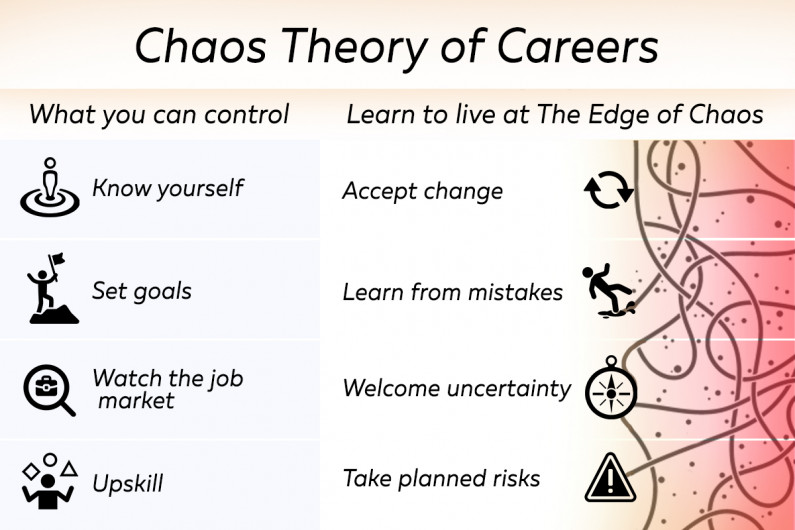Spotlight on the chaos theory of careers

Help clients balance planning and action with accepting uncertainty and change.
What's on this page?
Robert Pryor's and Jim Bright’s chaos theory of careers recognises that change and chance influence our lives and career development as much as stable factors like our ability and personality do.
By learning to be adaptable and resilient, we begin to live on what Pryor and Bright call the “edge of chaos”.
Summing up the chaos theory of careers
The chaos theory of careers recognises that:
- different factors influence our career development, such as economic conditions and the job market, and our own values, family and culture
- change is a part of life
- certainty about the future is impossible
- setbacks are opportunities to learn
- it's OK to make decisions with limited information
Chaos theory is especially useful for people who are:
- facing redundancy or unexpected life changes
- worried about choosing the “right” career
- struggling to get a job in their field
- facing changes in their job due to automation.
Help your clients live at the edge of chaos
You can put the chaos theory of careers into practice by helping clients plan and set goals but stay curious and open.
Encourage them to tap into their imagination when exploring options for their career.
The practitioner needs to think creatively and be prepared to sit with the client’s feelings of discomfort and vulnerability, because that tends to be where the shift happens.
Jean Ottley, career development consultant
Guide your clients through the chaos in their career development by helping them:
- understand their personality, skills and where they fit in the job market
- recognise their transferable skills
- use setbacks as an opportunity to learn new skills or explore new career options
- develop optimism
- be open to taking calculated risks
- see the value of backup plans, ie, a Plan B and C
- become aware of job market changes and know how to keep their skills up to date.
Find out more
Sign up to our e-newsletter for guidance on career practice and research on the latest career topics
Sources
- Arthur, N, Neault, R, McMahon M, ‘Chaos Theory for Career Counsellors,’ Career Theories and Models at Work: Ideas for Practice, CERIC, 2019.
- Jazvac, L, ‘Career Development from Chaos to Clarity – The Chaos Theory of Careers’, accessed February 2020, (www.careerprocanada.ca).
- Schlesinger, J, ‘Chaos and Your Career: A Framework for Chaos Theory of Careers in College Career Centers’, accessed February 2020, (www.linkedin.com).
Updated 25 Mar 2020
